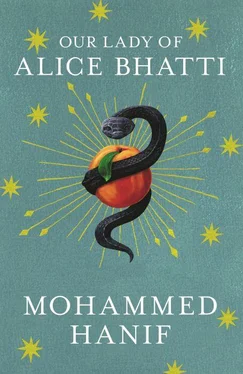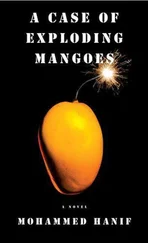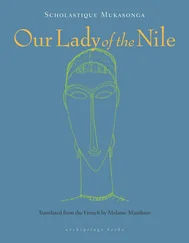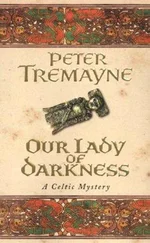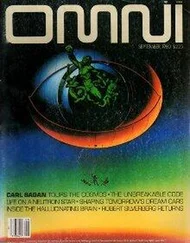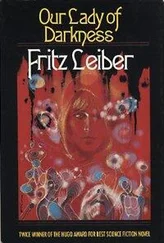When Sister Hina Alvi enters the delivery room, this is how she finds Noor, sticking to the wall in a corner. Sister Hina Alvi is fanning herself with her dupatta, her lips are chapped crimson and the first thing she does is expel Noor from the room. “Somebody must have given you birth, or did you just fall out of the sky? Now run along, go see if your mother is dead yet. We need that bed,” Hina Alvi says, pulling on her gloves. She stands over Alice Bhatti, who is preparing a scalpel and scissors for a cut.
“When did you take her vitals?”
“Forty-five minutes ago. She is all there, strong as a horse. But this thing is like a brick, refusing to move.” Alice Bhatti puts the girl’s file in front of Sister Hina Alvi.
“Why are you girls so fond of cutting up people? Let her do the hard work. Nobody tells them of the consequences when they open their legs for someone. When will she learn if she doesn’t learn now?” Hina Alvi bends down to take a closer look, then starts massaging the girl’s belly, first softly then vigorously in downward motions. She puts her ear to her stomach and closes her eyes for a few moments. Then she lifts her head, and Alice can tell from her eyes what thirty-five years of bedside experience has told her: Sister Hina Alvi believes that the baby is dead.
This irritates Alice Bhatti. This experience, this knowledge that brings you the news of death before you can see it with your own eyes. A death before birth. She feels as if she has failed in some basic way. Has she worked for fourteen hours to bring a dead baby into this world? Has this poor girl, with no father or any other relative in sight, nurtured this soul so that it is returned to the Lord before she can hear the baby’s first scream?
Can He take something from you before He has given it to you?
Sister Hina asks for a scalpel and gets busy between the girl’s legs. Alice Bhatti holds the girl’s head in the crook of her arm, takes her hand and gently urges her to push. The girl pushes, but it seems she is trying to take an impossible shit. After fifty minutes of the girl pushing and Sister Hina Alvi prodding with the scalpel, a tiny hand emerges. It is bluish in colour and hangs out like a big wart. Hina Alvi stands up exasperated, takes a deep breath, then bends down again, pushes the hand back and tries to align the head in the right direction by inserting two fingers and manoeuvring them in an attempt to hook an elbow or the neck. She works with the resigned concentration of someone who has pulled out too many dead babies from their mother’s wombs.
An hour later they bring into this world an oval wrinkly head, a smudge of a face with streaks of thin black hair. The girl has passed out from the effort. A shudder passes through her body periodically, as if the dead baby, still connected to her, is sending her signals, asking her to come with him.
Sister Hina Alvi turns the baby upside down, slaps its back. It hangs there like a skinned kitten, its body covered in splotches of blood, which is the only evidence that this thing might have been alive at some point. She wraps it in a sheet and puts it by its mother’s side. “She’ll want to see the fruit of her love when she wakes up. Poor thing, I know, but it might teach her a lesson,” says Hina Alvi.
Nobody mentions the fact that the baby is a boy, a dead boy but a boy.
Sister Hina Alvi peels off her gloves and throws them in a bin. Alice Bhatti mops the blood on the floor, collects yards of bandages and heaps of absorbent cotton, and while doing it, glances at Hina Alvi and realises that she is crying. Silently. She is scrubbing her hands at the sink, but Alice is sure that she is crying. There are no tears, no sound comes out of her mouth, but Alice can see that her face is broken, as if someone has clumsily rearranged her features. Her upper body shakes and her silent sobs echo in the delivery room. Hina Alvi covers her head and part of her face with her dupatta, as if getting ready to offer her prayers, and then abruptly leaves the room without giving Alice any instructions.
She stands next to the sink, lukewarm water washing over her hands, her eyes dry. She feels cold.
She dries her hands with the hem of her coat and goes and stands beside the bed, staring alternately at the sleeping mother and the dead baby. Without thinking, she kneels down and takes the baby’s hand into her hands. She opens the bluish fist and finds that the palm is smooth, with not a line, not a wrinkle. She holds the baby’s palm in both her hands and starts to pray. She prays like she has never prayed before, like nobody has prayed before. It doesn’t matter if there is a God listening or not, it doesn’t matter if He is busy somewhere else trying to avert a war or working out the chemical make-up of a deadly new virus. She just conjures up her Lord Yassoo and gives it to Him. She holds Him by His throat till He can’t breathe, she hangs from His robe till He can’t take a step forward, she grabs His goblet of wine and flings it across the room, she heckles Him when he descends from the Mount of Olives and starts to give His sermon, she snatches the fish from His disciples and throws it back into Galilee. She sings Him lullabies when His mother goes outside the stable to look for firewood, but that doesn’t last very long. When He washes His disciples’ feet, she accuses him of being a deadbeat Lord leaving poor wretched girls to bring dead babies into this world; she actually starts cursing him in Punjabi when He starts to raise Lazarus. What she is doing is probably the opposite of a prayer. In the heat of her demented devotion, she even forgets to ask Him for anything. Exhausted, she puts her head on the baby’s stomach and listens to Lord Yassoo’s eternal silence, feels his glacial incompetence. She hears no flapping of wings, no thunder, no lightning, no chorus of hymns rising in the background. She hears a door creak behind her and she opens her teary eyes slowly. Before she can turn around, she sees a little blood bubble pop out of the dead baby’s left nostril, then the toes on his right foot start twitching, as if he is trying to walk in his death sleep.
Alice Bhatti gets up in panic, turns around and sees Sister Hina Alvi looming over her, her face white with some unknown fear. Alice Bhatti’s first thought is that she has done something monstrous, broken some fundamental rule in the Sacred, she has done something that she wasn’t supposed to do, that Sister Hina Alvi was never meant to see.
“You have to leave now.” Sister Hina Alvi doesn’t even look towards the baby. “There are people outside looking for you, Senior’s people. They were asking about your husband, but I am sure they are actually looking for you. I have sent them to the medico-legal’s office but I know they’ll be back. You’d better hurry up and leave through the back entrance.”
Alice Bhatti remembers the men in a uniform that is not the uniform of any institution she knows. She remembers their caged animals’ eyes. She remembers their banter about the jail showers. It’s only when she is hurrying out of the door that she hears the baby’s first cry, followed by a series of faint squeals, as if he is posing a series of questions. What happened? Wasn’t I supposed to be dead? Where are you going in such hurry? Who are you leaving me with? Can’t I come with you?
Alice Bhatti reclines against the trunk of the Old Doctor, left hand covering her half-closed eyes, right arm flung aside, a lazy Buddha biding his time. Others might come here to be healed or find spiritual sustenance or firewood. Alice comes here to take a nap under its cool shade. Her head fits snugly in the wedge formed by gigantic roots that snake out of the earth; not very comfortable, but solid to lean against. Alice needs that solid thing to lean against in her life, but she needs it even more after the incident in the delivery room. She is surprised that even when she was slipping away from Senior’s men, clutching her pistol, she had been more worried about the baby than herself. That stubborn little baby has unsettled her. Not just the baby, but the people who now look at her as if she isn’t a diligent professional who occasionally goes beyond the call of her duty, but a messiah who has forsaken her right to a regular lunch break.
Читать дальше
